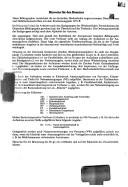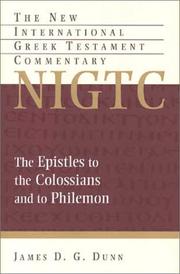Book
ISBN: 0802819087 Year: 1981 Volume: vol *42 Publisher: Grand Rapids (Mich.): Eerdmans
Abstract | Keywords | Export | Availability | Bookmark
 Loading...
Loading...Choose an application
- Reference Manager
- EndNote
- RefWorks (Direct export to RefWorks)
227.1*6 --- 227.1*6 Brief van Paulus aan de Colossenzen. Brief van Paulus aan Philemon --- Brief van Paulus aan de Colossenzen. Brief van Paulus aan Philemon --- Bible. --- Philemon (Book of the New Testament) --- Colossians (Book of the New Testament) --- Kolosserbrief (Book of the New Testament) --- Commentaries. --- Bible. N.T. Colossians --- Commentaries --- Bible. N.T. Philemon

ISBN: 3525533624 9783525533628 Year: 1972 Volume: 11 Publisher: Göttingen Vandenhoeck und Ruprecht
Abstract | Keywords | Export | Availability | Bookmark
 Loading...
Loading...Choose an application
- Reference Manager
- EndNote
- RefWorks (Direct export to RefWorks)
227.1*6 --- #GROL:SEMI-225<08> Stum 11 --- #GROL:SEMI-227.1*6 --- 227.1*6 Brief van Paulus aan de Colossenzen. Brief van Paulus aan Philemon --- Brief van Paulus aan de Colossenzen. Brief van Paulus aan Philemon --- Bible. --- Colossians (Book of the New Testament) --- Kolosserbrief (Book of the New Testament) --- Language, style. --- Bible --- Language, style

ISBN: 0802824412 Year: 1996 Publisher: Grand Rapids (Mich.): Eerdmans
Abstract | Keywords | Export | Availability | Bookmark
 Loading...
Loading...Choose an application
- Reference Manager
- EndNote
- RefWorks (Direct export to RefWorks)
227.1*6 --- 227.1*6 Brief van Paulus aan de Colossenzen. Brief van Paulus aan Philemon --- Brief van Paulus aan de Colossenzen. Brief van Paulus aan Philemon --- Bible. --- Philemon (Book of the New Testament) --- Colossians (Book of the New Testament) --- Kolosserbrief (Book of the New Testament) --- Commentaries.
Book
ISBN: 9780567678812 0567678814 9780567678829 Year: 2018 Volume: 585 Publisher: London Bloomsbury T&T Clark
Abstract | Keywords | Export | Availability | Bookmark
 Loading...
Loading...Choose an application
- Reference Manager
- EndNote
- RefWorks (Direct export to RefWorks)
In approaching the debate surrounding the opponents in Colossians from a methodological standpoint, Copenhaver contends that Paul was not actually confronting active opponents when he wrote the letter. Rather, Copenhaver takes the view that Paul's letter was written to the churches in the Lycus Valley, in a desire to develop their identity as a new people in Christ and to appeal to them to live a new kind of life. His warnings in Colossians 2 function as oppositional rhetoric, contrasting the religious practices of the Lycus Valley with this new belief. Paul's warnings are therefore broadly representative of the ancient world, while at the same time focused especially on two threads of historical referents, Judaism and pagan religions. Development of the above argument demonstrates that the challenge of reconstructing a singular opponent arises not only from the limitations of textual and historical evidence, but also from the assumptions and methodologies inherent in historical approaches to the text. By modifying these assumptions and adjusting the methodology, Copenhaver can show how Paul's letter takes on a new relationship to its historical context. --! From publisher's description.
Bible. --- Criticism, interpretation, etc. --- 227.1*6 --- 227.1*6 Brief van Paulus aan de Colossenzen. Brief van Paulus aan Philemon --- Brief van Paulus aan de Colossenzen. Brief van Paulus aan Philemon --- Colossians (Book of the New Testament) --- Kolosserbrief (Book of the New Testament)
Book
ISBN: 9780801026676 0801026679 Year: 2019 Publisher: Grand Rapids, MI Baker Academic
Abstract | Keywords | Export | Availability | Bookmark
 Loading...
Loading...Choose an application
- Reference Manager
- EndNote
- RefWorks (Direct export to RefWorks)
In this addition to the award-winning BECNT series, leading New Testament scholar and bestselling author G. K. Beale offers a substantive evangelical commentary on Colossians and Philemon. With extensive research and thoughtful chapter-by-chapter exegesis, Beale leads readers through all aspects of Colossians and Philemon--sociological, historical, and theological--to help them better understand the meaning and relevance of these biblical books. As with all BECNT volumes, this commentary features the author's detailed interaction with the Greek text and an acclaimed, user-friendly design. It admirably achieves the dual aims of the series--academic sophistication with pastoral sensitivity and accessibility--making it a useful tool for pastors, church leaders, students, and teachers. -- ‡c From publisher's description.
Bible. --- 227.1*6 --- 227.1*6 Brief van Paulus aan de Colossenzen. Brief van Paulus aan Philemon --- Brief van Paulus aan de Colossenzen. Brief van Paulus aan Philemon --- Colossians (Book of the New Testament) --- Kolosserbrief (Book of the New Testament) --- Philemon (Book of the New Testament)
Book
ISBN: 3170181343 Year: 2003 Publisher: Stuttgart Kohlhammer
Abstract | Keywords | Export | Availability | Bookmark
 Loading...
Loading...Choose an application
- Reference Manager
- EndNote
- RefWorks (Direct export to RefWorks)
227.1*6 --- 227.1*6 Brief van Paulus aan de Colossenzen. Brief van Paulus aan Philemon --- Brief van Paulus aan de Colossenzen. Brief van Paulus aan Philemon --- Bible. --- Colossians (Book of the New Testament) --- Kolosserbrief (Book of the New Testament) --- Criticism, interpretation, etc. --- Bible NT. Epistles of Paul. Colossians
Book
ISBN: 1282400053 9786612400056 9047424123 9789047424123 9789004170810 9004170812 9781282400054 6612400056 Year: 2008 Publisher: Leiden Boston Brill
Abstract | Keywords | Export | Availability | Bookmark
 Loading...
Loading...Choose an application
- Reference Manager
- EndNote
- RefWorks (Direct export to RefWorks)
While the use of the Old Testament in the New Testament has captured the attention of biblical scholars over the years, no study has been devoted to the presence of Scripture in Colossians, largely because there are no explicit quotations in Colossians. With the introduction of literary intertextuality into the discipline, however, scholars have begun to devote more attention to the NT authors’ less explicit references to Scripture, often labelled as ‘allusions’ and/or ‘echoes.’ Scholars, however, continue to debate what constitutes an allusion or echo, or how one validates a given proposal as such. This study proposes new definitions of these terms and offers a methodology on how to detect and validate them, using Colossians as a test case.
Rezeption --- Paulus (Apostel) --- Altes Testament --- Bible. --- Colossians (Book of the New Testament) --- Kolosserbrief (Book of the New Testament) --- Relation to the Old Testament. --- Antico Testamento --- Hebrew Bible --- Hebrew Scriptures --- Kitve-ḳodesh --- Miḳra --- Old Testament --- Palaia Diathēkē --- Pentateuch, Prophets, and Hagiographa --- Sean-Tiomna --- Stary Testament --- Tanakh --- Tawrāt --- Torah, Neviʼim, Ketuvim --- Torah, Neviʼim u-Khetuvim --- Velho Testamento --- Relation to Colossians.
Book
ISBN: 9781589834859 9781589834842 Year: 2010 Publisher: Atlanta Society of biblical literature
Abstract | Keywords | Export | Availability | Bookmark
 Loading...
Loading...Choose an application
- Reference Manager
- EndNote
- RefWorks (Direct export to RefWorks)
This book investigates Colossians as a "captivity" letter from the primary implied author, the imprisoned Paul, to an implied audience of mainly Gentile converts currently in danger of influence by local Jews or Jewish Christians. Utilizing a text-centered, literary-rhetorical, and audience-oriented method, it demonstrates new chiastic structures for the entire letter that progressively encourage the audience to resist deceit and conduct themselves according to all the wisdom at their disposal as holy ones in Christ.
Bible NT. Epistles of Paul. Colossians --- 227.1*6 --- 227.1*6 Brief van Paulus aan de Colossenzen. Brief van Paulus aan Philemon --- Brief van Paulus aan de Colossenzen. Brief van Paulus aan Philemon --- Bible. --- Colossians (Book of the New Testament) --- Kolosserbrief (Book of the New Testament) --- Criticism, interpretation, etc.
Book

ISBN: 9783788723675 Year: 2009 Publisher: Neukirchen-Vluyn Neukirchener
Abstract | Keywords | Export | Availability | Bookmark
 Loading...
Loading...Choose an application
- Reference Manager
- EndNote
- RefWorks (Direct export to RefWorks)
Bible NT. Epistles of Paul. Colossians --- 227.1*6 --- 227.1*6 Brief van Paulus aan de Colossenzen. Brief van Paulus aan Philemon --- Brief van Paulus aan de Colossenzen. Brief van Paulus aan Philemon --- Bible. --- Colossians (Book of the New Testament) --- Kolosserbrief (Book of the New Testament) --- Criticism, interpretation, etc.
Book
ISBN: 1850755590 9781850755593 Year: 1996 Volume: 118 Publisher: Sheffield Sheffield academic press
Abstract | Keywords | Export | Availability | Bookmark
 Loading...
Loading...Choose an application
- Reference Manager
- EndNote
- RefWorks (Direct export to RefWorks)
This book identifies Cynic philosophers as the opponents addressed by the epistle to the Colossians. This identification permits new solutions to old interpretative problems in Colossian studies. In particular, Martin offers a new translation and interpretation of Col. 2.16-23 as well as other problematic passages. Martin contends that the author of Colossians contrasts the hope of the gospel with his opposition's empty deceit and emphasizes important distinctions between Christian ethics and Cynic ethics. The study concludes that Christian ethics as articulated in Colossians transforms societ
Bible --- Criticism, interpretation, etc --- Bible. N.T. Colossians -- Criticism, interpretation, etc. --- Bible. N.T. Colossians. --- Christian ethics. --- Religion --- Philosophy & Religion --- Christianity --- 227.1*6 --- Brief van Paulus aan de Colossenzen. Brief van Paulus aan Philemon --- 227.1*6 Brief van Paulus aan de Colossenzen. Brief van Paulus aan Philemon --- Bible. --- Colossians (Book of the New Testament) --- Kolosserbrief (Book of the New Testament) --- Criticism, interpretation, etc.

 Search
Search Feedback
Feedback About UniCat
About UniCat  Help
Help News
News